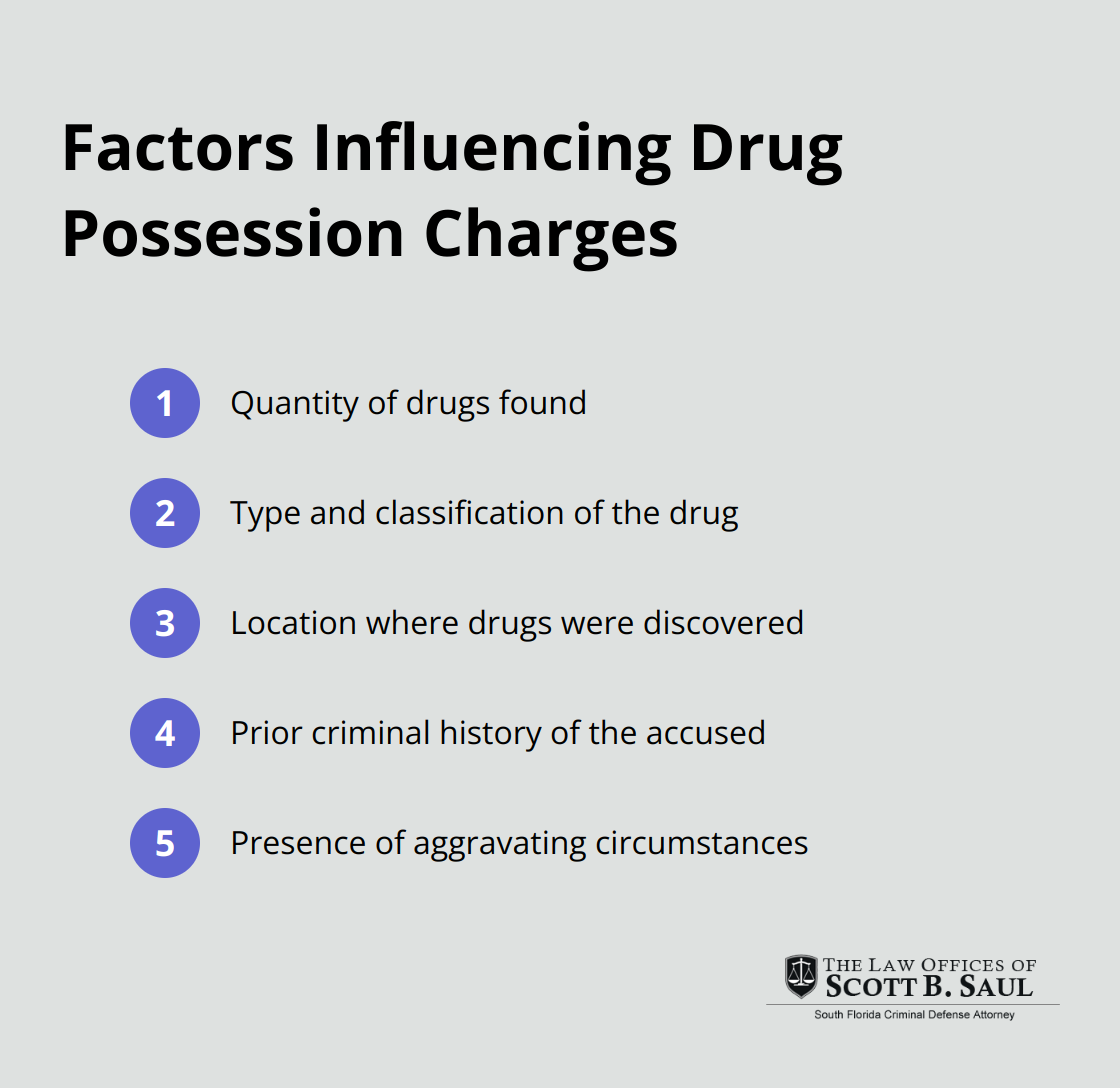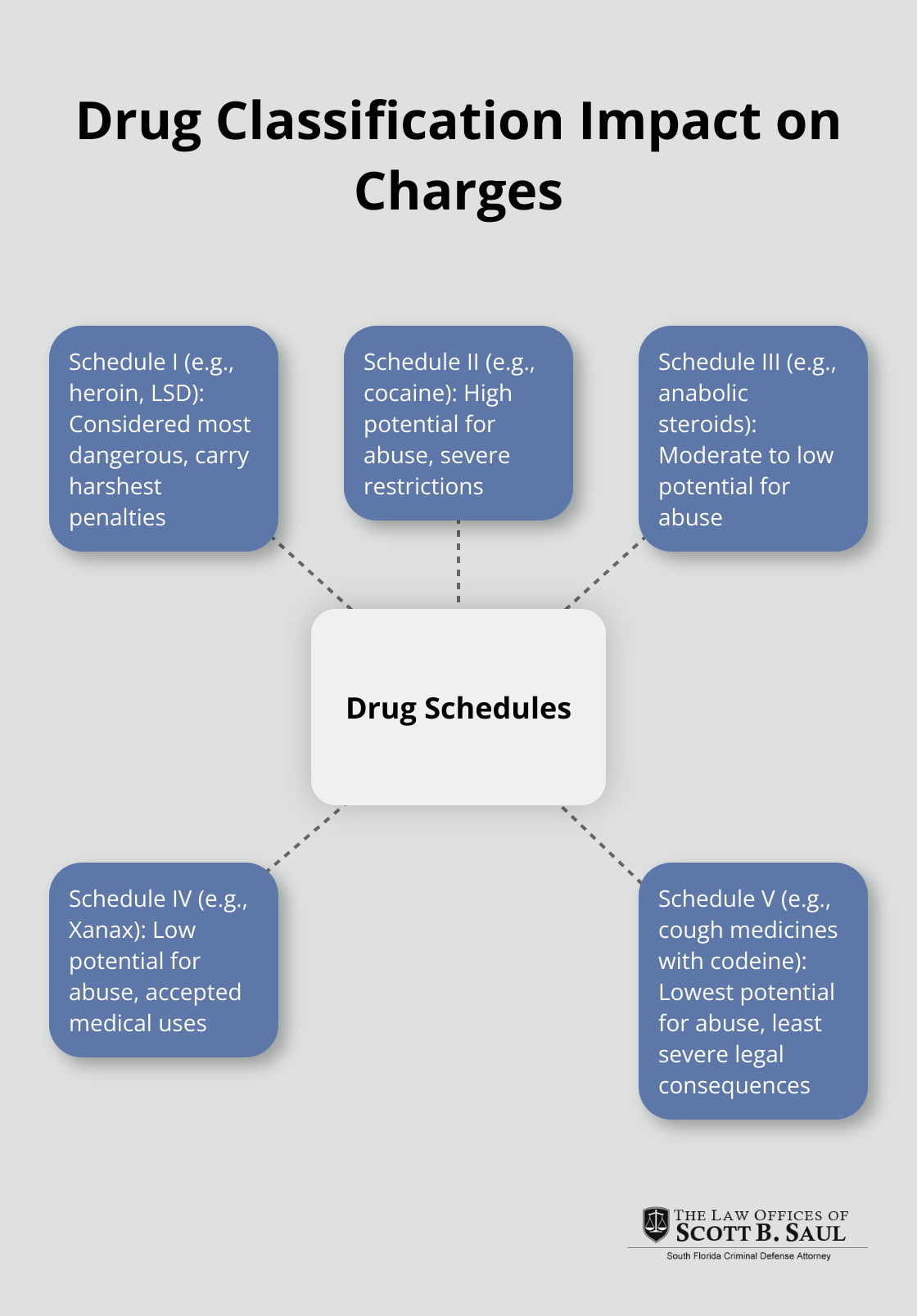What Does Drug Possession Mean in Legal Terms?
By : saulcrim | Category : Criminal Defense | Comments Off on What Does Drug Possession Mean in Legal Terms?
4th Aug 2025

Drug possession is a serious legal matter that can have far-reaching consequences. At Law Offices of Scott B. Saul, we often encounter clients grappling with the complexities of drug possession charges.
Understanding the legal meaning of drug possession is crucial for anyone facing such allegations. This blog post will explore the definition, types, and potential ramifications of drug possession charges to help you navigate this challenging legal terrain.
What Is Drug Possession in Legal Terms?
Drug possession refers to the control of a controlled substance without legal authorization. This control can manifest in various forms, including physical possession, storage in a residence or vehicle, or access to drugs in a shared space.
Types of Controlled Substances
The law categorizes controlled substances into different schedules based on their potential for abuse and accepted medical use. Schedule I drugs (such as heroin and LSD) are considered the most dangerous and carry the harshest penalties. Schedule V substances (like certain cough medicines with codeine) have lower abuse potential and less severe legal consequences.
It’s worth noting that marijuana, despite its legalization in many states, remains a Schedule I drug under federal law. This discrepancy between state and federal regulations often creates confusion and legal challenges for individuals facing drug possession charges.
Simple Possession vs. Intent to Distribute
The legal system makes a clear distinction between simple possession and possession with intent to distribute. Simple possession typically refers to having drugs for personal use. The amount of drugs found plays a crucial role in determining whether a case is treated as simple possession or intent to distribute.
For instance, if law enforcement catches you with a small amount of cocaine, they might consider it simple possession. However, if you possess a large quantity of cocaine along with packaging materials and scales, they may charge you with possession with intent to distribute, which carries much harsher penalties.
Constructive Possession
Another important concept in drug possession laws is constructive possession. This means you can face charges of possession even if drugs aren’t found directly on your person. Drugs found in a shared bag – If you borrowed a bag from someone and it contained a controlled substance, you could be charged with constructive possession.
Factors Influencing Drug Possession Charges
Several factors can influence the severity of drug possession charges:
- Quantity of drugs found
- Type and classification of the drug
- Location where drugs were discovered (e.g., near schools or playgrounds)
- Prior criminal history of the accused
Understanding these nuances in drug possession laws is essential for anyone facing such charges. The specific circumstances of each case can significantly impact the legal strategy and potential outcomes. If you’re dealing with drug possession charges, seeking immediate legal counsel is important to protect your rights and explore all available defense options.

As we move forward, we’ll examine the various factors that can influence drug possession charges in more detail, providing a comprehensive understanding of this complex legal issue.
What Factors Affect Drug Possession Charges?
Drug possession charges can vary significantly based on several key factors. These elements can dramatically impact case outcomes. Let’s examine the most influential factors in drug possession cases.
Quantity of Drugs
The amount of drugs found plays a pivotal role in determining charges. Smaller quantities typically result in simple possession charges, while larger amounts may lead to more serious allegations like intent to distribute. For example, in Florida, possession of less than 20 grams of marijuana is a misdemeanor, but anything over that becomes a felony. This distinction can mean the difference between a fine and potential jail time.
Drug Classification
The type of drug involved significantly influences charges and potential penalties. Drugs are categorized into schedules based on their perceived danger and medical use. Schedule I drugs like heroin or LSD carry the harshest penalties. For instance, possession of any amount of heroin in Florida can result in a third-degree felony charge, punishable by up to five years in prison.
Location of Possession
Where the drugs are found can escalate charges. Possession near schools, parks, or other designated drug-free zones often leads to enhanced penalties. In Florida, being caught with drugs within 1,000 feet of a school can double the standard sentence. This means a typical two-year sentence could become four years simply due to location.
Prior Criminal History
A person’s criminal record heavily influences how drug possession charges are handled. First-time offenders may qualify for diversion programs or reduced sentences. However, repeat offenders face increasingly severe penalties. In some jurisdictions, a third drug offense can result in mandatory minimum sentences (regardless of the quantity involved).
Aggravating Circumstances
Additional factors can worsen drug possession charges. These may include:
- Possession of weapons alongside drugs
- Evidence of drug distribution (e.g., scales, packaging materials)
- Involvement of minors in drug-related activities
These factors don’t exist in isolation; they interact to shape the overall legal landscape of a drug possession case. A first-time offender caught with a small amount of marijuana away from any protected areas might face minimal consequences. In contrast, a repeat offender found with a significant quantity of cocaine near a school could look at substantial prison time.
Laws and their application can vary significantly between jurisdictions. What might be a minor offense in one state could be a serious felony in another. This complexity highlights the need for experienced legal counsel familiar with local laws and practices when facing drug possession charges.

The consequences of drug possession charges extend beyond legal penalties. They can affect employment opportunities, housing options, and personal relationships. In the next section, we’ll explore these long-term impacts and discuss strategies for mitigating the effects of drug possession charges.
Real-World Impacts of Drug Possession Charges
Drug possession charges can affect various aspects of an individual’s life, often lasting for years after legal proceedings conclude. This chapter explores the far-reaching consequences beyond the courtroom.
Financial Burdens
The financial toll of drug possession charges can be substantial. Fines for drug possession vary widely depending on the jurisdiction and case specifics. These fines often come with court costs and legal fees, which can quickly add up to tens of thousands of dollars.
Many individuals facing drug charges must pay for mandatory drug education or treatment programs as part of their sentence. These programs can cost hundreds or even thousands of dollars, adding to the already significant financial strain.
Incarceration and Its Effects
Jail or prison time is a real possibility for those convicted of drug possession. The length of incarceration varies based on factors like the type and amount of drug involved, as well as the individual’s criminal history.
Incarceration doesn’t just mean a loss of freedom; it often leads to job loss and a gap in employment history that’s difficult to explain to future employers. This can create a cycle of financial instability that’s hard to break.
Career and Housing Challenges
A drug possession conviction can severely limit employment opportunities. Many employers conduct background checks, and a drug-related offense can be a red flag. Certain professions may become completely off-limits to those with drug convictions.
Housing can also become a significant challenge. Many landlords and property management companies conduct background checks and may deny housing to individuals with drug convictions. This can force people into less desirable living situations or areas with fewer opportunities.
Long-Term Personal and Professional Repercussions
The effects of a drug possession charge can linger long after any legal penalties have been fulfilled. Professional licenses may be revoked or denied, limiting career advancement opportunities. Travel restrictions can be imposed, potentially affecting both personal and professional life.
The stigma associated with a drug conviction can strain personal relationships and alter social dynamics. This emotional toll shouldn’t be underestimated; it can lead to isolation and mental health challenges that compound the other difficulties faced by those with drug convictions.

Final Thoughts
Drug possession charges can alter the course of a person’s life. The legal meaning of drug possession encompasses various factors, including quantity, type, and location of the substance. These elements determine the severity of charges and potential consequences. Financial burdens, incarceration, and long-term personal and professional repercussions often follow a drug possession conviction.
We at Law Offices of Scott B. Saul understand the complexities of drug possession cases in South Florida. Our team has over 30 years of experience in criminal defense (with a focus on drug-related charges). We develop tailored defense strategies for each client’s unique situation, aiming to protect their rights and future.
Our experienced legal counsel can help you navigate the challenging terrain of drug possession charges. We explore all available options for your defense and work to minimize the impact on your life. Don’t let a drug possession charge derail your future – contact us to safeguard your rights and interests.
Archives
- September 2025 (8)
- August 2025 (8)
- July 2025 (8)
- June 2025 (9)
- May 2025 (9)
- April 2025 (8)
- March 2025 (9)
- February 2025 (8)
- January 2025 (9)
- December 2024 (10)
- November 2024 (5)
- July 2024 (2)
- June 2024 (2)
- May 2024 (2)
- April 2024 (2)
- March 2024 (2)
- February 2024 (2)
- January 2024 (2)
- December 2023 (2)
- November 2023 (2)
- October 2023 (2)
- September 2023 (2)
- August 2023 (1)
- July 2023 (2)
- June 2023 (2)
- May 2023 (2)
- April 2023 (2)
- March 2023 (2)
- February 2023 (2)
- January 2023 (2)
- December 2022 (2)
- November 2022 (2)
- October 2022 (2)
- September 2022 (2)
- August 2022 (2)
- July 2022 (2)
- June 2022 (2)
- May 2022 (2)
- April 2022 (2)
- March 2022 (2)
- February 2022 (2)
- January 2022 (2)
- December 2021 (2)
- November 2021 (2)
- October 2021 (2)
- September 2021 (2)
- August 2021 (2)
- July 2021 (2)
- June 2021 (2)
- May 2021 (2)
- April 2021 (2)
- September 2020 (5)
- July 2020 (4)
- June 2020 (4)
- May 2020 (4)
- April 2020 (5)
- March 2020 (4)
- February 2020 (4)
- January 2020 (4)
- December 2019 (1)
- November 2019 (4)
- October 2019 (4)
- September 2019 (4)
- August 2019 (4)
- July 2019 (5)
- June 2019 (4)
- May 2019 (4)
- April 2019 (4)
- March 2019 (4)
- February 2019 (4)
- January 2019 (4)
- December 2018 (4)
- November 2018 (5)
- October 2018 (5)
- September 2018 (4)
- August 2018 (4)
- July 2018 (7)
- June 2018 (4)
- May 2018 (4)
- April 2018 (8)
- March 2018 (4)
- February 2018 (4)
- January 2018 (4)
- November 2017 (4)
- October 2017 (4)
- September 2017 (4)
- August 2017 (7)
- July 2017 (6)
- June 2017 (4)
- May 2017 (4)
- April 2017 (4)
- March 2017 (4)
- February 2017 (7)
- January 2017 (4)
- December 2016 (7)
- November 2016 (4)
- October 2016 (4)
- September 2016 (10)
- August 2016 (4)
- July 2016 (4)
- June 2016 (4)
- May 2016 (4)
- April 2016 (4)
- March 2016 (4)
- February 2016 (7)
- January 2016 (4)
- December 2015 (5)
- November 2015 (4)
- October 2015 (7)
- September 2015 (4)
- August 2015 (4)
- July 2015 (13)
- June 2015 (9)
- May 2015 (8)
- April 2015 (6)
- March 2015 (4)
- February 2015 (4)
- January 2015 (4)
- December 2014 (4)
- November 2014 (4)
- October 2014 (4)
- September 2014 (3)
Categories
- Adjudication (1)
- Bankruptcy (1)
- Burglary Crimes (3)
- calendar call (1)
- Car Accident (1)
- Criminal Defense (355)
- Cyber Crimes (7)
- DNA (1)
- Domestic Violence (9)
- Drug Crimes (5)
- DUI (12)
- Embezzlement (1)
- Environmental Crimes (4)
- Expungement Law (2)
- Federal Sentencing Law (3)
- Firearm (3)
- Forgery (4)
- General (82)
- Healthcare (3)
- Immigration (1)
- Indentity Theft (1)
- Insurance (5)
- judicial sounding (2)
- Juvenile Crimes (4)
- Manslaughter (4)
- Money Laundering (3)
- Organized Crime (1)
- Racketeering (1)
- Reckless Driving (3)
- RICO (3)
- Sealing and Expunging (2)
- Sex Offense (1)
- Shoplifting (1)
- Suspended Driver's License (1)
- Traffic (4)
- Trending Topics (1)
- White-collar Offenses (1)

